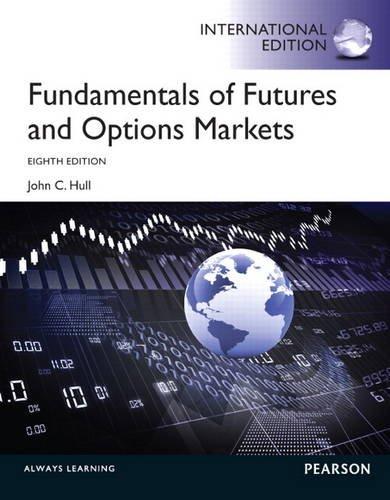Question
Answer this question IN the Space PRovided Below after CAREFULLY reading: Review the article by Mayra Rodriguez Valladares (2021) and the conclusion of the paper
Answer this question IN the Space PRovided Below after CAREFULLY reading:
Review the article by Mayra Rodriguez Valladares (2021) and the conclusion of the paper by Basel Committee on Banking Supervision Climate-related risk drivers and their transmission channel, April 2021, and show how you can apply what was covered in BUS307 in a real-world situation. Insightful observations and discussion will attract a superior grade. Conversely, inserting paragraphs/sections from your texts, the internet, and the Valladares (2021) article will not be viewed favourably. Also, recall that plagiarism can result in a zero grade. Be concise
Banks Can Suffer Financial Losses From Physical And Transition Climate Change Risk Drivers
Apr 14, 2021,
Mayra Rodriguez Valladares Senior Contributor, Banking & Insurance
The physical and transition climate change risk drivers are likely to generate significant costs and financial losses for banks and the banking system globally. Both banks and bank supervisors need to evaluate banks existing risk management policies, processes, and procedures to assess whether banks are sufficiently capitalized and liquid to cope with climate-change related risks.
Climate-related Risks, Opportunities, and Financial Impact
The increasing severity and frequency of physical climate risk events can have a significant adverse impact on the borrowers, counterparties and service providers interconnected to banks as well as to the physical properties of banks. Natural disasters, for example, can cause borrowers and banks counterparties financial losses which in turn could make them unable to meet their obligations to banks; natural disasters can also lead to market volatility which would make pricing collateral posted by borrowers or counterparties difficult to value accurately.
Estimated Global Economic Loss From Natural Catastrophe Events (Not all natural catastrophes) Bank for International Settlements, Banque de France, and MunichRe
Banks and the banking system will also be affected by climate-change transition risks. As more and more countries are trying to reduce their carbon emissions, changes in technological developments, government policies, financial regulations, or investor and consumer sentiment can also impact banks business strategies, cost structure, and earnings.
Transition Risks
Climate-related risk drivers and their transmission channels a report published by the Basel Committee on Banking Supervisions Task Force on Climate-related Financial Risks (TFCR) suggests that these physical and transition drivers impact on banks can be observed through traditional risk categories at banks. The following TCFR table below summarizes the potential effects in each risk type:
Physical and Transition Climate Risk Drivers, Basel Committee on Banking Supervision, TCFR
Importantly, the TFCR explains that thus far, existing literature largely focuses on the impacts of climate risk drivers on those aspects of the economy relevant to banks credit risk, and to a lesser extent on market risk. Unfortunately, there is little work that takes climate risk drivers all the way through to the impact on banks. Presently, there is a lot more data and information on the impact of physical risks on banks and the banking system. Because trying to estimate the impact of transition risks is forward looking by nature, the analysis of transition risks is focused on scenario analysis. To better understand transmission channels going forward, analysis on the realized impact of transition risks on banks across various jurisdictions would be valuable.
Climate-change related risks will impact banks around the world differently due to the structure of a countrys economy, financial markets, and the availability of property insurance. As the TFCR report explains differences in factors such as geographical location, topography and proximity to water mean some regions are expected to experience more severe storms, more frequent droughts or greater and more concentrated precipitation in response to rising temperatures. Additionally, banks will be exposed to different levels of transition risk depending on the likelihood of governments or financial regulators policy actions, technological innovation or broad shifts in consumer and investor sentiment in different countries. According to the TFCR, More comparative analysis on differences in the impact of climate risks arising from variations in economies and market structure would inform our understanding of transmission channels.
There will definitely be a bigger role for the international standard setter for banks, Basel Committee on Banking Supervision, to play in recommending principles or policies for banks and bank regulators in the area of climate-related risks. Given that the BCBSs members hold the largest percentage of banking assets globally, the BCBS is in a very good position to analyze whether and how climate-related financial risks could be incorporated into the Basel III risk management framework or whether new principles or even a new framework might be necessary. According to the TFCR, part of the Basel Committees near-term work would be to identify gaps in the current Basel Framework, where climate-related financial risks may not be sufficiently addressed. The BCBS works should be comprehensive and could be the foundation for the Committees future work in exploring possible measures to address gaps where relevant.
Step by Step Solution
There are 3 Steps involved in it
Step: 1

Get Instant Access to Expert-Tailored Solutions
See step-by-step solutions with expert insights and AI powered tools for academic success
Step: 2

Step: 3

Ace Your Homework with AI
Get the answers you need in no time with our AI-driven, step-by-step assistance
Get Started


